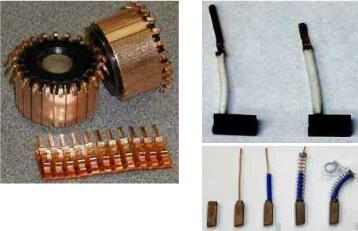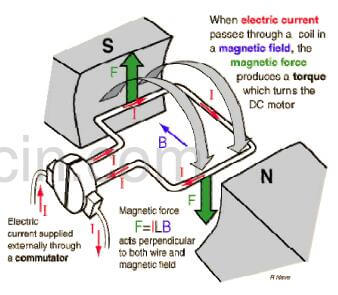carbon brush – commutator interface: see Fig.1.

Fig.1-carbon brush and commutator interface
what is commutation: The process of current reversal in armature coils which ideally take place when the coils are cutting the minimum lines of magnetic flux-the neutral position. see Fig.2, when electric current passes through a coil in a magnetic field, the magnetic force produces a torque which turns the DC motor; Electric current applied externally through a commutator; magnetic force F=ILB acts perpendicular to both wire and magnetic field.
Why we choose carbon brush? what is the characteristics /advantages of carbon brush? see bellow:
-High electrical and thermal conductivity
-Solid lubricant
-Withstands high temperature

Fig.2-how commutator works
-Low density
-Non-welding
-Low coefficient of thermal expansion
-Low cost
-Machineable/moldable
-High resistance carbon
The above advantages are specially belongs to electrical carbon.
Commutator materials: one type is copper, and another is carbon.
Copper commutator:
–Used on nearly all FHP motors
–Copper No’s. CA105/CA107 (Cu with ~0.09% silver)
Excellent electrical conductivity; resistanct to softening during fusing; develops stable film on surface contacting brush.
Carbon commutator:
-Used for automotive fuel pumps; Hot molded onto copper shell; Excellent life and motor performance;
related news /articles:
Carbon brush and brush materials-electrical carbon (2)
New modernization technology— Carbon brush material
Carbon Brush | Electric Brush Guide by CFCCARBON LTD
Resin graphite material | carbon brush materials- manufacturer in China